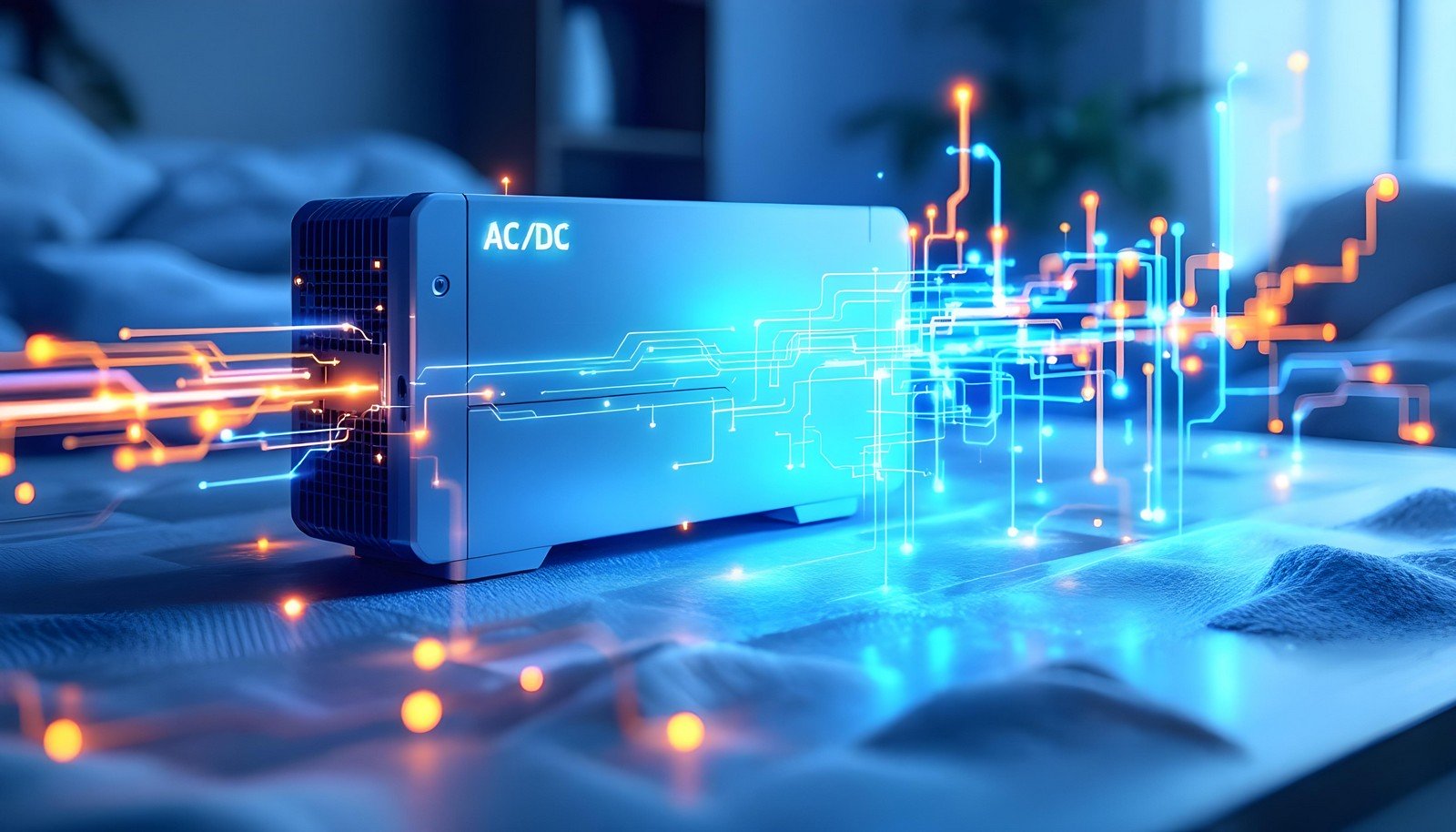AC DC Power Converter

Quick Navigation:
- AC DC Power Converter Definition
- AC DC Power Converter Explained Easy
- AC DC Power Converter Origin
- AC DC Power Converter Etymology
- AC DC Power Converter Usage Trends
- AC DC Power Converter Usage
- AC DC Power Converter Examples in Context
- AC DC Power Converter FAQ
- AC DC Power Converter Related Words
AC DC Power Converter Definition
An AC DC power converter is an electronic device that transforms alternating current (AC) from a power source into direct current (DC), which is used to power electronic devices, batteries, and other DC-based systems. The device utilizes rectifiers, filters, and voltage regulation circuits to ensure a stable DC output, even when the AC input fluctuates. AC DC power converters are essential in applications ranging from household electronics to industrial machinery and renewable energy systems.
AC DC Power Converter Explained Easy
Think of electricity as water flowing in pipes. Alternating current (AC) is like water sloshing back and forth in the pipe, while direct current (DC) is water flowing steadily in one direction. An AC DC power converter is like a special machine that takes the back-and-forth water (AC) and makes it flow smoothly in one direction (DC) so your gadgets can use it.
AC DC Power Converter Origin
The concept of converting AC to DC emerged with the development of electrical systems in the late 19th century. Innovations by inventors like Thomas Edison and Nikola Tesla laid the groundwork, with Tesla championing AC power systems and Edison pioneering DC technologies. The need for converters arose to integrate the two systems for broader applications.
AC DC Power Converter Etymology
The term "converter" is derived from Latin "convertere," meaning "to turn around" or "transform," signifying its role in transforming current types.
AC DC Power Converter Usage Trends
AC DC power converters have seen a steady rise in demand, particularly with the proliferation of consumer electronics, electric vehicles, and renewable energy systems. Advances in technology have also introduced compact, efficient, and environmentally friendly designs, fueling their adoption across industries.
AC DC Power Converter Usage
- Formal/Technical Tagging:
- Power Electronics
- Rectification
- Voltage Conversion - Typical Collocations:
- "AC DC adapter"
- "power supply unit"
- "rectifier circuits"
- "DC voltage output"
AC DC Power Converter Examples in Context
- Laptop chargers use an AC DC power converter to turn household AC into DC power for the device.
- Solar inverters employ converters to manage the energy produced by solar panels.
- Automotive systems use AC DC converters to power various electronic components in vehicles.
AC DC Power Converter FAQ
- What is an AC DC power converter?
It converts alternating current (AC) into direct current (DC) for powering devices. - Where are AC DC converters used?
They are used in electronics, vehicles, renewable energy systems, and industrial applications. - How does an AC DC power converter work?
It uses rectifiers and filters to transform AC into smooth DC output. - What is the difference between AC and DC?
AC alternates direction periodically, while DC flows steadily in one direction. - Can an AC DC converter work with renewable energy sources?
Yes, they are often integrated into solar and wind energy systems. - Are AC DC converters energy efficient?
Modern converters are highly efficient, reducing energy waste. - What is a rectifier in an AC DC converter?
It’s a component that converts AC to DC. - Do all electronics require an AC DC converter?
Most electronics require DC power and use converters to function. - What happens if you use the wrong converter?
It can damage the device or lead to inefficient operation. - Are there portable AC DC power converters?
Yes, many portable models are available for on-the-go applications.
AC DC Power Converter Related Words
- Categories/Topics:
- Power Electronics
- Renewable Energy
- Consumer Electronics
Did you know?
The first AC DC power converters were large and inefficient, but modern designs use advanced semiconductors and compact components, making them highly efficient and lightweight, with applications in everything from smartphones to spacecraft.
PicDictionary.com is an online dictionary in pictures. If you have questions or suggestions, please reach out to us on WhatsApp or Twitter.Authors | Arjun Vishnu | @ArjunAndVishnu

I am Vishnu. I like AI, Linux, Single Board Computers, and Cloud Computing. I create the web & video content, and I also write for popular websites.
My younger brother, Arjun handles image & video editing. Together, we run a YouTube Channel that's focused on reviewing gadgets and explaining technology.



Comments powered by CComment